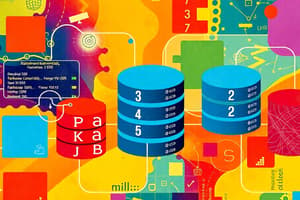Podcast
Questions and Answers
What is a database management system (DBMS)?
What is a database management system (DBMS)?
A software application that helps users define, create, maintain, and manipulate a database.
What is a database?
What is a database?
A collection of data, organized so that it can be easily accessed, managed, and updated.
What is data modeling in the context of a database management system?
What is data modeling in the context of a database management system?
The process of defining the structure and relationships between different data elements in a database.
What is Data Manipulation Language (DML)?
What is Data Manipulation Language (DML)?
Why are database management systems essential?
Why are database management systems essential?
What are the key tasks that a database management system helps users with?
What are the key tasks that a database management system helps users with?
What is the purpose of Data Definition Language (DDL)?
What is the purpose of Data Definition Language (DDL)?
What is the main function of Data Control Language (DCL)?
What is the main function of Data Control Language (DCL)?
How do Customer Relationship Management (CRM) systems utilize databases?
How do Customer Relationship Management (CRM) systems utilize databases?
What type of information do Human Resource Management (HRM) systems store?
What type of information do Human Resource Management (HRM) systems store?
What are the main functions of Supply Chain Management (SCM) systems using databases?
What are the main functions of Supply Chain Management (SCM) systems using databases?
How do Financial Management systems utilize databases?
How do Financial Management systems utilize databases?
What is the role of database management systems in modern businesses and organizations?
What is the role of database management systems in modern businesses and organizations?
What are the key benefits that businesses can derive from leveraging database management systems?
What are the key benefits that businesses can derive from leveraging database management systems?
What is the significance of using databases in Healthcare Management systems?
What is the significance of using databases in Healthcare Management systems?
Name one industry where database management systems have wide-ranging applications.
Name one industry where database management systems have wide-ranging applications.
Flashcards are hidden until you start studying
Study Notes
Computer Applications: A Comprehensive Guide
Computer applications are software programs designed to perform specific tasks on computers, making them more efficient and productive. These applications can be categorized into various types, including database management systems. In this article, we will delve into the world of computer applications, focusing on database management systems and their applications.
Database Management Systems
A database management system (DBMS) is a software application that helps users define, create, maintain, and manipulate a database. A database is a collection of data, organized so that it can be easily accessed, managed, and updated. Database management systems are essential for managing and storing large amounts of data, such as customer information, financial records, and product inventories.
Some key aspects of database management systems include:
-
Data Modeling: This process involves defining the structure and relationships between different data elements in a database. There are several data modeling techniques, such as entity-relationship (ER) modeling, which helps create a logical structure for the data.
-
Data Manipulation Language (DML): This is a set of instructions used to perform various operations on the data, such as inserting, updating, and deleting records from the database.
-
Data Definition Language (DDL): This language is used to create and modify the structure of the database, including creating tables, adding columns, and setting constraints.
-
Data Control Language (DCL): This language is used to control access to the database and its data, ensuring that only authorized users can view or modify the data.
Applications of Database Management Systems
Database management systems have a wide range of applications across various industries. Some of the most common applications include:
-
Customer Relationship Management (CRM): CRM systems use databases to store customer information, allowing businesses to manage their interactions with customers more effectively.
-
Human Resource Management (HRM): HRM systems store employee information, track their performance, and manage payroll and benefits.
-
Supply Chain Management (SCM): SCM systems use databases to manage inventory, track shipments, and monitor supplier performance.
-
Financial Management: Financial management systems use databases to store financial records, track transactions, and generate financial reports.
-
Healthcare Management: Healthcare management systems use databases to store patient information, track treatments, and manage billing.
In conclusion, computer applications, particularly database management systems, play a crucial role in modern businesses and organizations. They help manage and store large amounts of data, making it more accessible and easier to manipulate. By leveraging these applications, businesses can improve their efficiency, productivity, and decision-making capabilities.
Studying That Suits You
Use AI to generate personalized quizzes and flashcards to suit your learning preferences.




